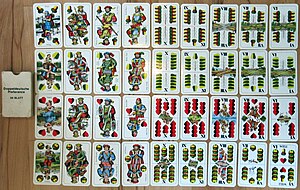
Sixty-Six or 66, sometimes known as Paderbörnern, is a fast 5- or 6-card point-trick game of the marriage type for 2–4 players, played with 24 cards. It is an Ace-Ten game where Aces are high and Tens rank second. It has been described as "one of the best two-handers ever devised".

Preferans or Russian Preference is a 10-card plain-trick game with bidding, played by three or four players with a 32-card Piquet deck. It is a sophisticated variant of the Austrian game Préférence, which in turn descends from Spanish Ombre and French Boston. It is renowned in the card game world for its many complicated rules and insistence on strategical approaches.
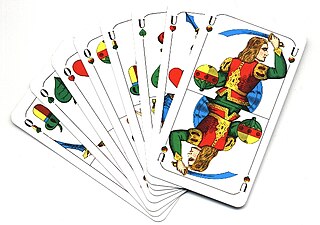
Schafkopf, also called Bavarian Schafkopf, is a popular German trick-taking card game of the Ace-Ten family for four players that evolved, towards the end of the 19th century, from German Schafkopf. It is still very popular in Bavaria, where it is their national card game played by around two million people, but it also played elsewhere in Germany and in Austria. It is an official cultural asset and important part of the Old Bavarian and Franconian way of life. Schafkopf is a mentally demanding pastime that is considered "the supreme discipline of Bavarian card games" and "the mother of all trump games."
Ulti, or Ultimó, is Hungary's national trick-taking card game for three players. It is virtually unknown outside its home borders.

Königrufen or Königsrufen is a four-player, trick-taking card game of the tarot family, played in Austria and Southern Tyrol, with variants for two, three and six players. As with other regional tarot card games, it is usually called Tarock by its players. It is the only variant of Tarock that is played over most of Austria and, in 2001, was the most popular card game in Austria after Schnapsen and Rommé. By 2015, it had become "the favourite card game of Austrians". It has been described as the most interesting tarot game for four players, the "Game of Kings", a game that requires intelligence and, with 22 trumps in play, as good "training for the brain".

Mariáš or Mariasch a three-player, solo trick-taking game of the King–Queen family of Ace-Ten games, but with a simplified scoring system. It is one of the most popular card games in the Czech Republic and Slovakia, but is also played in Bavaria in Germany as well as in Austria. The Hungarian national card game Ulti is an elaboration of Mariáš.

Schnapsen, Schnapser or Schnapsa is a trick-taking card game of the Bézique (Ace-Ten) family that is very popular in Bavaria and in the territories of the former Austro-Hungarian Empire and has become the national card game of Austria and Hungary. Schnapsen is both of the point-trick and trick-and-draw subtypes.

Bauerntarock also called Brixentaler Bauerntarock or Brixental Tarock, is a point-trick card game played in the Brixental, Austria. It may have originated in the 19th century either as an adaptation of 54-card Tapp Tarock onto the cheaper and smaller 36-card German pack. Another possibility is that it was adapted from the 78-card Grosstarock or Taroc l'Hombre game as the ratio of trumps to non-trumps is almost the same. It uses the Skat Schedule found in popular regional games such as Jass and Schafkopf. It is closely related to Bavarian Tarock, German Tarok, Württemberg Tarock and especially Dobbm. Like Bavarian Tarock and Tapp, Brixental Bauerntarock and Dobbm do not belong to the true tarot games, but have adopted rules from Tapp Tarock. The most fundamental difference between these games and true tarot games is in the use of German or French decks instead of true Tarot playing cards.

Gaigel is a card game from the Württemberg region of Germany and is traditionally played with Württemberg suited cards. It is a Swabian variant of Sechsundsechzig and may be played with 2, 3, 4 or 6 players. However, a significant difference from Sechsundsechzig and other related games like Bauernschnapsen is the use of a double card deck. The four-player game is usually called Kreuzgaigel. The game emerged in the early 19th century.
Schneider is a term used in many card games for a low card point score that results in boosting an opponent's game score. The threshold is usually half the total points needed for a win; below the threshold, the player or team is Schneider; above it they are 'out of Schneider'. Its natural extension is Schwarz, said of a player or team who loses the game without taking a single trick.

Bavarian Tarock or, often, just Tarock, is a card game that was once popular in Bavaria and also played in parts of Austria as well as Berlin. The name is a clue to its origin in the historical German game of [Gross-]Tarock, a game using traditional Tarot cards. At some point in the mid- to late-18th century, attempts were made to emulate Taroc using a standard 36-card German-suited pack, resulting in the formerly popular, south German game of German Tarok. During the last century, the variant played with a pot (Haferl) and often known as Bavarian Tarock or Haferltarock, evolved into "quite a fine game" that, however, has less in common with its Tarock progenitor. German Tarok also generated the very similar game of Tapp, played in Württemberg, and both are related to Bauerntarock, Dobbm and the American games of Frog and Six-Bid Solo. Bavarian Tarock should not be confused with Königrufen, also known as Austrian Tarock or just Tarock.

Dobbm or Tappen is a card game played in the Stubai valley in Austria and is one of a family of games derived from the Tarot game of Grosstarock by adapting its rules to a regular, shortened pack of 36 cards. The ranking and point value of the cards in Dobbm is typical of the family and, like its other members, one player always plays as a soloist against all the others. It is highly popular in the Stubai valley among card players of all generations, but is unknown in the surrounding regions.

Dreierschnapsen, Talonschnapsen or Staperlschnapsen is a three-hand variant of the popular Austrian card game, Bauernschnapsen. The rules are very similar to those for Bauernschnapsen except that, instead of two teams of two players, one player bids to become the soloist against the other two who form a temporary alliance. Another difference is that the game makes use of a talon with which the soloist may exchange cards to improve his hand, hence its alternative name of Talonschnapsen. The game is usually played with William Tell cards.
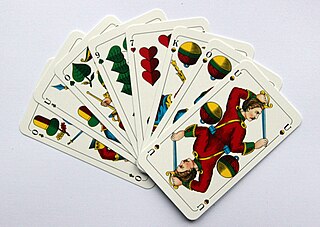
Mucken or Muck is a variation of the popular German card game, Schafkopf. However, unlike Schafkopf, it must always be played in teams of 2 players, so there are no soloist or Rufer ("caller") contracts. Mucken is mainly found in the province of Upper Franconia in the German state of Bavaria. Mucken is often played in Franconian restaurants, as it is part of the Franconian pub culture. The details of the rules vary greatly, even from village to village.

Zwanzigerrufen or Zwanz'gerrufen is the leading trick-taking card game of the Tarock family in many regions of eastern Austria. Its rules are simpler than the game of Königrufen which is more widely played in the whole of Austria. As is common in Tarock games, the cards have various point values – the primary goal in an individual game is to win the majority of points.

Binokel is a card game for two to eight players that originated in Switzerland as Binocle, but spread to the German state of Württemberg, where it is typically played with a Württemberg pattern pack. It is still popular in Württemberg, where it is usually played in groups of three or four as a family game rather than in the pubs. In three-hand games, each player competes for himself, while in four-hand games, known as Cross Binokel (Kreuzbinokel), two teams are formed with partners sitting opposite one another. The game was introduced to America by German immigrants in the first half of the 20th century, where it developed into the similar game of pinochle. Binocle was still played in Switzerland in 1994. In south Germany, the game is sometimes called by its Swabian name, Benoggl.

Blattla is a Bavarian card game for four players, who usually form two teams of two for each deal. It is a simplified version of Schafkopf and Bierkopf and is thus a point-trick game. Unlike those two games, in Blattla the Obers and Unters are not permanent trumps. In order to learn the rules of Schafkopf, it can be an advantage to first become familiar with Blattla. The game is traditionally played with Bavarian pattern cards.
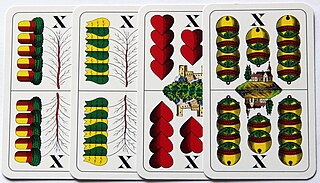
Matzlfangen is a traditional point-trick, card game for 4 players that originated in the Bavarian province of Upper Palatinate over 200 years ago and spread to Austria. It is still played in a few places today. The game is named after the Ten or Matzl, which plays a key role.
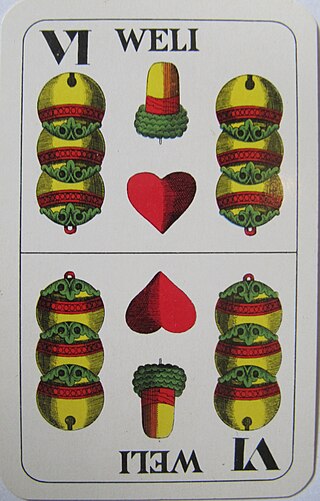
Mulatschak or Fuchzenawa is an Austrian card game for two to five players that comes from the Salzburg area and is considered the quintessential game of the region. Although Mulatschak has been called the national card game of Salzburg, its rules were almost certainly unpublished before 2004. Mulatschak is a member of the Rams family in which the key feature is that players may choose to drop out of the game if they believe their hand is not strong enough to take a minimum number of tricks. There is a variant known as Murln or Murlen, which is played in Vienna and the Styria.

Dreeg, Nuremberg Dreck or Nuremberg Dreeg is a card game that is described as "a special Franconian form of Sixty-Six with the wonderful name of Nuremberg Dreck." It is the most common variant of Sixty-Six in the Franconian region of Bavaria, Germany. It is a compendium game based on four variations of Sixty-Six and is usually played by four players, although three may also play.
